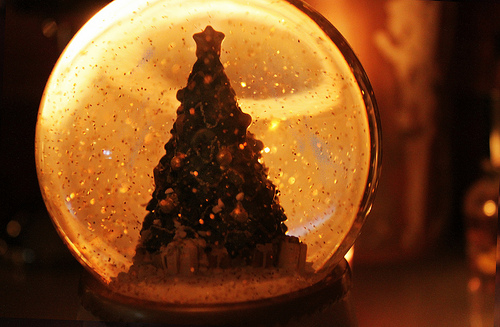Snowglobes of Tradition
/Grief says “You ate the Eggs Benedict 15 days after you held your son in your arms. You ate the Eggs Benedict consumed with the memory of his gasping for breath and dying. You did all of this because it was tradition on Christmas morning. Did it make any difference?”
It’s hard to think about tradition without thinking about family. It’s hard to think about tradition without thinking about your parents and it is impossible to think about tradition without imagining handing down your traditions to your children.
I don’t, to be perfectly frank, have much of a family. My mother and I are, at least for the present, estranged. Whether or not that estrangement will end and if it will end is up to her. My other family is in BC. I have no siblings. All of this makes holiday tradition ever harder. It often feels like I have to create a new community for each occasion. Without children, I confess, I feel lost at Christmas. Without children I wonder if I look pathetic as I decorate the house and plan meals.
I like the Eggs Benedict Christmas morning, I like the prime rib with Yorkshire pudding. I like the stockings, I like the tourtiere. You could write my epitaph thus: She prepared a lot of food and there was no one to eat it.
I wanted a large family that did the same things with every year. I wanted to have the same faces around the Christmas table, many faces. What I wanted, or at least what I thought I wanted was for things to never change. I thought if I didn’t have to build my own community each holiday, if my community was built in, then holidays wouldn’t be so hard, so lonely and feel so futile.
I thought, by having children, I would have frozen Christmas into a perfect snow globe for all time.
 Flickr Ali 505Except, that’s not what life does, that’s not how families work. That’s not even how traditions go.
Flickr Ali 505Except, that’s not what life does, that’s not how families work. That’s not even how traditions go.
There are no snow globes of tradition, except those we create in our imagination and memory. That's why we dream about tradition - because we can create perfection in our imagination or in our memory. We have no such guarantees in our forward-thinking life. It is possible, even likely, that I could have had 4 children and spent Christmas thirty years hence all alone.
Age, birth, death, marriage and divorce change our traditions. We bring in new ones, we toss out old ones.
I can change my thoughts on tradition. I can ease up, I can be more flexible, but that belies a single truth: I don’t want to be more flexible. I don’t want to have to give up the notion of tradition and I certainly don’t want to give up on the snow globe of perfect imagination.
I wanted to hang on to all of this. I wanted to pass this on to my children. I wanted to tell them that I ate Eggs Benedict every Christmas morning for all of my life and they should too. I wanted stockings, overflowing with goodness, carefully placed on their beds while they slept.
This year I looked at what I thought that perfect snow globe would be, what I really wanted and I realized it is not possible. My snow globe will always be missing something – someone.
In the middle of the snow globe, mixed in with the snow is a heavy dusting of grief. This year, the fourth year after Gabriel’s death, I am finally seeing it. Grief at Gabriel's death, at life with no children swirls around the holidays because it pervades our traditions.
And maybe that’s where the struggle really lies. Maybe the need to examine the traditions I continue, maybe the frustration at creating my own community for every holiday really comes from this: they are but a remembrance of what I don’t have and what I can't do. Without living children I am powerless to create that perfect snow globe. Anything I can create, through what traditions I maintain, through what community I can build will never match to what I imagined.
Tell us: How have your traditions changed? Do you approach the holidays the same way? What sort of community do you include now? How did Christmas go for you?

